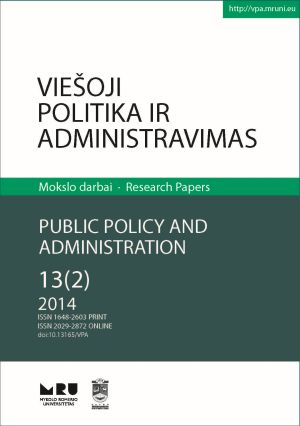Vietos savivaldybių kompetencija ir jos kaita Lietuvoje 1990‒2013 metais
Local Self-Government in Lithuania in 1990-2013: Changes of the Competence of Municipalities
Author(s): Algirdas AstrauskasSubject(s): Politics / Political Sciences
Published by: Mykolas Romeris University
Keywords: municipality; local authority; competence of municipality
Summary/Abstract: There are many research papers on local self-government since 1990s till present in Lithuania. However, according to the author, there is a lack of research papers where the dynamic (changing) Lithuanian local self-government system would be analyzed systematically (i.e., not just a separate aspect (element), but the entire local self-government system consisting of separate and linked together aspects (elements)). The author has published several articles in the academic journal “Public Policy and Administration”. In this article, the author presents an opinion and judgment based on more than twenty years’ worth of gathered knowledge about aspects of local self-government system, such as system of administrative-territorial units, the national and international legal acts regulating local self-government, the main definitions – local municipality and local authority – as well as their development throughout the period of 1990 till present and the like. The aim of this article is to continue the systematical research of Lithuanian local selfgovernment system during the twenty three years (1990-2013) and determine other important aspects (elements) of local self-government system, which are largely discussed about in theory and practice – competence of municipality and it’s development during the period since 1990 till present day. Summarizing the results, the author presents the following conclusions: 1. The importance of one of the key elements of the local self-government system, i.e. the competence of municipalities, is very significant: the principles or methods of legal regulation laid down for the competence of municipalities and applied by the State; the content and scope of the competence defined for municipalities ( i.e. the extent of powers in certain spheres of activity); the structure of the competence defined for municipalities (i.e. the relationship between the powers attributed to the groups of own (independent) competence and the competence assigned by the State); a variety of forms of implementation permitted to be applied; the volume of funds available from all possible sources in order to implement the competence and other elements may generally be considered to be the criteria of quality evaluation of the local self-government system in a given country to determine whether the country has a real (‘true’) local self-government or merely a declarative one. 2. To define the competence of municipalities (local authorities), the content elements of the competence are not sufficient. In order to characterize in detail the competence of municipalities (local authorities) of one country or comparably different countries, it is appropriate to apply the system of elements consisting of: 1) way of defining the competence of municipalities (local authorities); 2) grouping of the competence of municipalities (local authorities); 3) content of the competence of municipalities (local authorities); 4) forms and ways of implemen
Journal: Viešoji politika ir administravimas
- Issue Year: 13/2014
- Issue No: 2
- Page Range: 187–208
- Page Count: 22
- Language: Lithuanian

